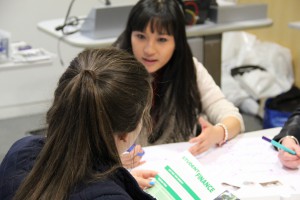 A ‘whole life-cycle’ approach cuts through Nottingham Trent University’s outreach work to widen participation in schools, colleges and the local community.
A ‘whole life-cycle’ approach cuts through Nottingham Trent University’s outreach work to widen participation in schools, colleges and the local community.
The university’s outreach programme encompasses more than 700 activities – including placing more than 300 students in schools to provide pupil support through its Students in Classrooms (SiC) Scheme reaching 30,000+ pupils, from primary school to post-16 students. It also matches 1,000 volunteers to a range of community projects with the Nottingham Trent Volunteering (NTV) programme.
 At primary school, pupils are introduced to the benefits of HE and life as a student via workshops in schools, a two-day summer school in year 5 and a campus visit in year 6. The university also co-ordinates Nottingham and Nottinghamshire Children’s University which encourages seven to 14-year-old pupils to participate in extra-curricular learning and rewards them with a “graduation” ceremony upon completion.
At primary school, pupils are introduced to the benefits of HE and life as a student via workshops in schools, a two-day summer school in year 5 and a campus visit in year 6. The university also co-ordinates Nottingham and Nottinghamshire Children’s University which encourages seven to 14-year-old pupils to participate in extra-curricular learning and rewards them with a “graduation” ceremony upon completion.
Support for pupils in Key Stages 3 and 4 continues with activities such as summer residential experiences, campus visits and skills development sessions. NTU also runs the successful “Raising the Grade” revision conferences for subjects including maths, English, science and modern foreign languages.
 Post-16 students at college are helped to prepare for university – covering topics such as finance, UCAS and practical workshops. While mature students are targeted through a separate ‘Returning to Learning’ programme which includes aspects on progression into postgraduate study and employment.
Post-16 students at college are helped to prepare for university – covering topics such as finance, UCAS and practical workshops. While mature students are targeted through a separate ‘Returning to Learning’ programme which includes aspects on progression into postgraduate study and employment.
The outreach activities form a constructive programme, with each building on the learning from the previous session. The focus is on developing skills and character through enquiry-based and cooperative activities which places emphasis on the student taking control of their own learning, in particular the ‘flipped classroom’ approach.
This student life-cycle approach has been successful in opening up higher education to a broader range of people in the community. And at the same time improves the experience and outcomes of undergraduate students participating in the programmes. For example, in 2012/13, 84.3% of students who had taken part in Students in Classrooms and 79.5% of students who had taken part in Nottingham Trent Volunteering schemes achieved at least a 2:1 degree classification, compared with 67.5% of all Nottingham Trent University students achieving this standard.
Pre-entry qualifications could not account for participants’ better than expected performance – as students taking part in both of these outreach programmes were more likely to achieve a ‘good degree’ than the Nottingham Trent University average across a range of pre-entry tariff bands.
Graduates from the NTV and SiC programmes were also significantly less likely to be unemployed approximately six months after graduation than the average for all Nottingham Trent University graduates and over twice as likely to have progressed to postgraduate study. Key indicators show the success of this scheme, with many exceeding the university’s own targets.




